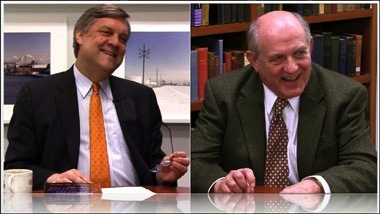Can Charles Murray help us be happy?
Curmudgeon, yes. Conservative, yes. Happy? As Andy Kline succinctly writes:
It is widely agreed, by friend and foe alike, that Charles Murray is one of the keenest observers of what unites and divides us as Americans. Against the backdrop of a closely argued, evidentially rich, and consistently challenging analysis, Murray has composed an eloquently imagined -- yet often politically incorrect -- response to the social, economic and cultural transformations of contemporary America.
Insightful, yes. Provactive, yes. But happy?
If you have not delved into the mind and life-long work of Charles Murray, this hour-long conversation with David Blankenhorn is a great place to start. In this podcast interview, Blankenhorn and Murray discuss the overall arc of Murray's thought through the lens of family structure as well as historic and contemporary debates about marriage and closes with thoughts on happiness.
Blankenhorn travels back to Murray's childhood to trace the roots of his thought on capitalism, education and the social conservative movement. They re-hash the core principles of Murray's 1985 tome, Losing Ground, which began Murray's career of perceptively evaluating contemporary public policy programs. They journey through his work on libertarianism to The Bell Curve (with Richard J. Herrnstein) that envisioned the fracturing of marriage, family and vocation upon class lines to Coming Apart that reported that the fracture had indeed occurred.
Towards the middle of the conversation they turn in earnest to the task of answering a critical question, which in Murray's work is inevitably tied to the pursuit of happiness: Can marriage be saved? And yes, both he and Blankenhorn believe that the social good of marriage should be available to all, gay and straight. In the conversation with Blankenhorn, Murray describes how the witness of gay and lesbian friends in relationships that he could only describe as marriage in their tenor and practice of loyalty and commitment led to his confession during an interview with Charlie Rose that he supports same-sex marriage. However, a key justice issue impacting marriage in our time includes not only sex, but economics. Murray's work echoes and reinforces on-going social science findings on marriage, out of wedlock birth, class and education:
The past several decades have seen a separation of marriage and childbearing, particularly among the economically disadvantaged. In 2009, 41% of children were born outside of marriage, compared with 11% in 1970. Among recent births, almost 60% of children born to women without a high school education were born outside of marriage compared with only 6% of those born to women who graduated from college.
They discuss how to understand this fracturing and whether and how public policy solutions can impact the trend lines. In answer to "What will save marriage?" Murray repeats his belief that only a true resuscitation of the cultural values of the goods of marriage can shift the tide. Monetary incentives and educational training doesn't work the same way that conversations at the dinner table or collective values and even social stigma do. He stresses that "cultural changes are the only effective ones," especially when you want to communicate that "bringing a child into the world when you are not emotionally, intellectually, [or] financially prepared to care for one, is profoundly wrong."
But, back to happiness. Murray closes the conversation with reflections on one of his favorite books he has authored, In Pursuit: Of Happiness and Good Government. A book he wrote in his mid-40s that describes what will give a person pride at seventy years of age:
Be a good neighbor. Be a good spouse and/or parent. Have a satisfying vocation. (he now adds "Have Faith.")
He clarifies that now, in his 70th year, he sees that his 40-year-old self was blind to "the gratification of having a family around." He did not realize the deep sense of satisfaction that could come from the thickness of the generations moving on into the future. In his most recently released book, The Curmudgeon's Guide to Getting Ahead: Dos and Don'ts of Right Behavior, Tough Thinking, Clear Writing, and Living a Good Life, Murray expounds on these thoughts and gives advice for a happy life.
What do you think? Is marriage a critical component to the happy life?

